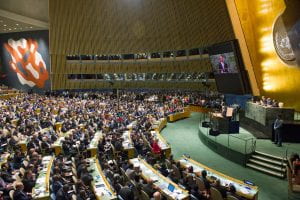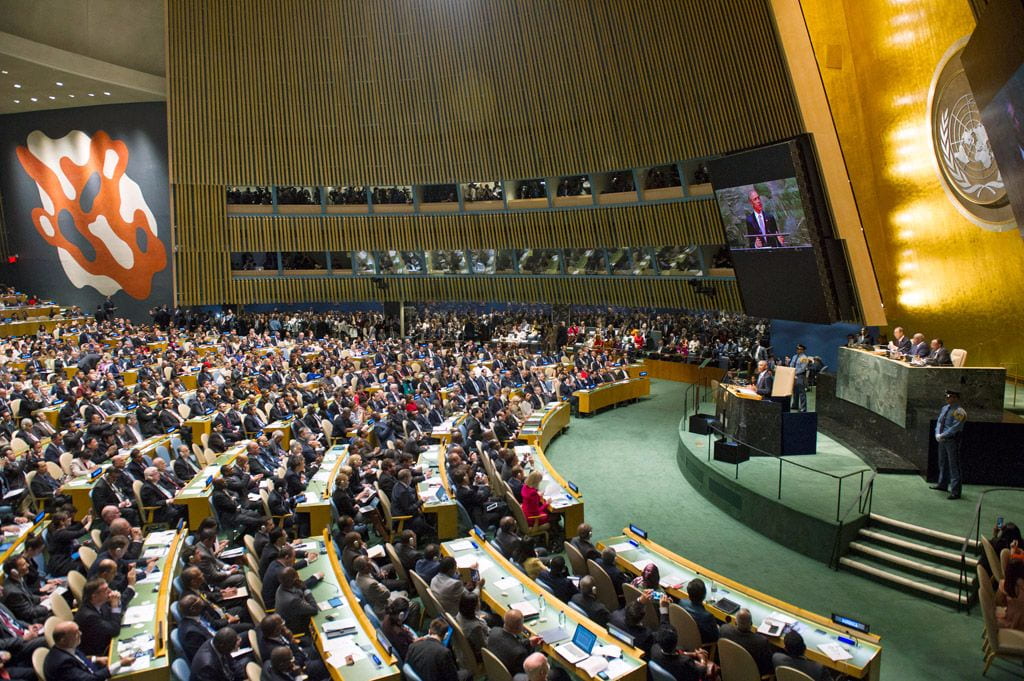BY CHANDLER GARLAND – STAFF WRITER
Beginning on September 25, the United Nations (U.N.) General Assembly held its 70th meeting. The meeting opened with speeches from several world leaders, including representatives from the United States, Russia, China, France, among others. These opening comments set the tone for the rest of the sessions and debates for the rest of the assembly. One of the biggest issues brought up by many world leaders was the issue of Syria and the terrorist group ISIS.
For several years now, Syria has experiencing turmoil and political upheaval. Both U.S. President Barack Obama and Russian President Vladimir Putin gave speeches at the opening session urging international cooperation between member nations and diplomacy with Syria to bring and end to the terrorist threats. However, though both The U.S. and Russia appear to be on the same side the kind of cooperation they spoke about is unlikely to happen.
“The big problem at the UN and specifically in regards to Syria is that they both would like international cooperation to secure peace in Syria and solve civil conflict—they just have different ideas of how to do it.” Visiting Assistant Professor of Internation Relations Dr. Betsy Montgomery-Smith said. “The United States wants to remove Assad. The Russian government thinks the Assad government is most stable in Syria and we should strengthen it and back it against ISIS.”
This disagreement over the role of the Assad government puts a severe wedge in solving the problem of ISIS in Syria.
“The United States has so many hang ups, if you are a terrorist we aren’t going to talk to you,” Assistant Professor of Politics Dr. Robert Bosco said. “Were not going to talk to you if you don’t think Assad should go. They put so many conditions on it. It’s oronic that a country would say that ‘we can’t handle all the world’s problems on ourselves’ but the United States is exacerbating the problem by arming the insurgency.”
The unwillingness of both nations, the U.S. and Russia, to cooperate and compromise throws a huge wrench in any plans to obtain peace.
Of course, the general assembly itself cannot do anything about Syria. The U.N. General Assembly can propose resolutions that are passed on to their proper sub-group of the UN. The question of Syria, like other matters of international security and crisis, will have to go through the security council—a board of 15 members, 5 of which are permanent “Big Five” members. The Big Five are essentially the victors of the Second World War—the U.S., Russia, France, Great Britain, and China. Each of these members has absolute veto power.

The General Assembly has no authority over peacekeepers or peace-keeping measures, the only thing they can do is make a resolution. The Security Council is the body that makes the decision but since US and Russia are one of the Big Five they have the ability to veto each other.
Though the U.N. will most likely not be able to take action concerning the political crisis and terroristic threats in Syria, there is hope for the refugee crisis that has culminated from the crisis in the Middle East.
“There are policies, not actually law, but policies that require states to accept refugees and not send them back. As more and more European states agree to take on refuges, the UN should work on building a way to sustain these refugees, adequate housing, jobs, etc,” Dr. Montgomery-Smith said.
The U.N. will work through the United Nations High Commissioner for Refugees, which is one of the biggest organizations represented.
“It is heavily involved and can coordinate with the Red Cross and member governments in Europe,” Dr. Bosco said.
For now, this newfound focus on Syria will force outsiders to pay attention to the refugee crisis.
“Countries outside of its immediate vicinity are now forced to pay attention- but each with country with its own interests in mind,” Assistant Professor of Politics Dr. Dr. Dina Badie said. “For Europe, the refugee crisis is pressing and a resolution to the civil war is of utmost importance in order to stem the tide of Syrians flowing into Europe.”
In practical terms, the U.N. can only do as much as its member states are willing to do, but there have been arrangements and efforts to give the refuges a place to go. At the General Assembly, President Obama stated that America will be opening its doors to 100,000 refugees—a step that may help resolve the crisis at hand.
